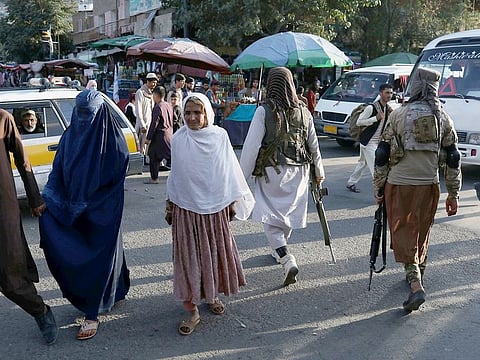United States must keep its promise to Afghans
Too many of us have too much survivor’s guilt already from our time in Afghanistan

Please don’t let my friends die. It’s a simple plea to the US government from many American veterans of the Afghanistan war. And so far that plea is being ignored.
My friends Nabi and Kohee are what our political class calls “Afghan allies.” They were Afghan officers whom I served with during my second deployment to Afghanistan. God blessed me the day I was assigned to work with such fine men. They taught me about their country, I taught them about intelligence analysis, and together we tracked the threats to Afghanistan.
Now our immigration system is leaving these men and their families to die. The special immigrant visa (SIV) for interpreters excludes Afghan soldiers like my friends. The Refugee Admissions Program is backlogged. And now Citizenship and Immigration Services (CIS) is blocking Afghans from accessing humanitarian parole, their only remaining lifeline. Director Ur M. Jaddou of CIS and Homeland Security Secretary Alejandro Mayorkas need to fix humanitarian parole for America’s Afghan allies.
The Army gave me a Bronze Star for the work that I did with Nabi and Kohee. That helped get me into a good school, get a good job, a good life — the American dream. But for my friends, the fact that they worked with the Americans is a death sentence, and I dare not use their full names given the ongoing threats to them and their families. Some gunmen raided Nabi’s house the very night Kabul fell. If he had not already gone into hiding, he’d be dead. Kohee and his family had to flee their home when some of their new neighbours threatened them with death.
Working with fellow veterans and volunteers, I desperately tried to get Nabi, Kohee and their families into the Kabul airport so they could escape. But US guards turned them away, all while some planes were taking off with unfilled seats. Nabi evaded a half-dozen Taliban checkpoints to get within six feet of his assigned pickup location, only to be attacked with tear gas by American guards and whipped by a fighter. It was only after days of failure at the airport that we made the difficult decision to help them flee to Pakistan.
In Pakistan, they live with the risk of being deported back to Afghanistan. They can barely go outside. The kids can’t go to school. And they can’t go to another country that will accept them. Every time I see a message notification on my phone, I’m afraid.
All we can do is wait and see whether the United States will keep its promise to our Afghan allies. We’ve filed for humanitarian parole and paid more than $7,000 in filing fees to CIS so my friends can come to the United States, just like the thousands of luckier Afghans who got into Kabul airport. Our bipartisan team of volunteers submitted letters of support from Army officers and non-commissioned officers, photographic evidence of their service with US forces, certificates from US and Nato units and affidavits attesting to the threats to their families. We’ve raised tens of thousands of dollars and built a support team to provide these families with housing, food, medical care, education and anything else they need to resettle in the United States. We got them out of Afghanistan and could get them to the United States if only CIS chooses to let them live.
I don’t know what to do for the Afghan allies who are still stuck in Afghanistan. But I know that my friends aren’t the only ones hiding in other countries. The US knows that they are in serious danger, yet it seems they have started rejecting their applications. If it is actually the policy of the United States to turn away veteran-endorsed Afghan allies, then our bureaucracy isn’t just passively “letting them die”; it is actively encouraging this.
Please, Secretary Mayorkas, don’t let my friends die.
For our friends and other Afghan allies, it is humanitarian parole or eventual deportation. If we won’t do it for the Afghans, then we should do it for our veterans. Too many of us have too much survivor’s guilt already. There’s already a grave at Arlington I ought to visit more often. I know that I couldn’t bear another 13 souls on my conscience.
Please, President Biden, don’t let our friends die.
Jayson Harpster is a US. Army veteran
- Washington Post


